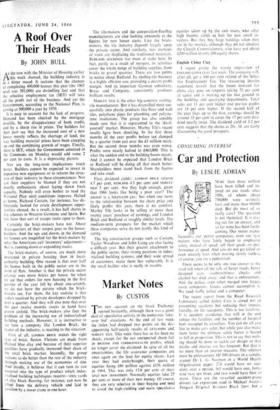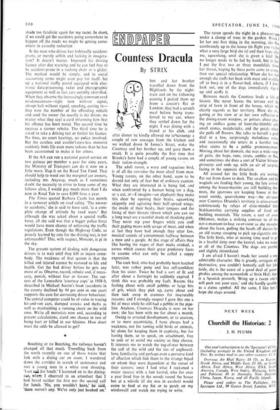CONSUMING INTEREST
Car and Protection
By LESLIE ADRIAN
There seems to be only one true answer to the road toll when all the talk of better roads, better designed cars. roadworthiness checks and alcohol has died away: and that is enforcement. And the police, even when merged into larger, more competent. forces, cannot accomplish it. We need traffic police and a computer.
The recent report from the Road Research Laboratory called Safety Cars is aimed not at preventing accidents but reducing their impact, literally, on the occupants. This is too fatalistic. It is accident avoidance that will in the end reduce the fatalities and the number of hospital beds occupied by casualties. You can do all you like to make cars safer, but while you also make them faster the ultimate safety factor is bound to fall in proportion. This is not to say that noth- ing should be done to tackle car design so that deaths and injuries are less frequent. But that is no more than an interim measure. The solution must be enforcement. Of 500 drivers in a sample. argued Dr L. G. Norman in a World Health Organisation paper. 274 would have no acci- dents over a period, 165 would have one, forty- nine two, ten three, and two would have four or more. These are the so-called accident-prone drivers (an expression used in Michael Austin's Penguin Original .occident Black Spot. but a
shade too fatalistic again for my taste). In short, if we could get the accidents going somewhere to happen off,the roads we might be getting some- where in casualty reduction
Is the man who drives fast habitually accident- prone, or merely selfish and lacking in imagina- tion? It doesn't matter. Impound his driving licence after due warning and he can feel free to be accident-prone in a rocking chair or a glider. The method would be simple, and in social accounting terms might even pay for itself. Set up a national traffic patrol equipped with elec- tronic data-processing, radar and photographic equipment as well as fast cars suitably identified. When they observe the increasingly common. road misdemeanours—right turn without signal, abrupt halt without signal, speeding, cutting in— they note the number of the offending vehicle and send the owner (he usually is the driver, no matter what they say) a card informing him that his offence has been noted. The second time he receives a sterner rebuke. The third time he is asked to take a driving test or forfeit his licence. No fines, no court hearings, no police involved. But the careless and couldn't-care-less motorist suddenly finds life even more tedious than he has been accustomed to make it for others.
If the AA can run a national patrol service on two guineas per member a year for sixty years, the Ministry of Transport can do it now on a little more. Slap it on the Road Tax Fund. That should help to weed out the marginal car owners, including me. Anyway, much as I sometimes doubt the necessity to strive to keep some of my fellows alive, I would pay much more than I do now in Road Tax to save 8,000 lives a year.
The Times quoted Barbara Castle last month in a turnover article on road safety. The answer to accidents,' she is said to have said, 'is a com- plete change of attitude by road users.' But although she was asked about a special traffic force, all she said was that a bigger police force would have more chance of enforcing the traffic regulations. Even though the Highway Code, so piously learned by rote for the driving test, is not enforceable? This, with respect, Minister, is pi in the sky.
The present system of dealing with dangerous drivers is to wait until they kill or injure some- body. The weakness of that system is that the killed and injured cannot be restored to life and health. Get the bad driver before he gets any more of us. Observe, record, rebuke and, if neces- sary, punish, without fear or favour. The suc- cess of the Lancashire 'courtesy cops' in 1938-9, described in Michael Austin's book (accidents in the county declined by 44 per cent in one year) supports the case for correcting driver behaviour. The central computer could be of value in tracing hit-and-run cars, dumped wrecks and thefts as well as maintaining a running check on the wild ones. We're all motorists now and, according to present calculations, stand one chance in two of being hurt or killed in our lifetime. How short must the odds be allowed to get?















































 Previous page
Previous page